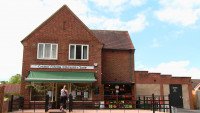Premises
"Out with the old..."
The existing village post office and shop became the new Church Fenton Community Shop. With a flat to generate rent above the retail space and located in the middle of the main street, it was perfect for our plan and - most importantly – soon to be available!
In our case, we had to move fast to get the building off the market and secure it for our plans to become a community shop.
Thanks to some property development experience in our steering group, we knew how to nominate the premises as a ‘community asset’ through a Community Right To Bid – this bought us the time we needed to refine our plan and secure the required funding.


Community Right To Bid allows communities to nominate buildings / land as an asset of community value. At the start of the project the Steering Committee nominated the former Post Office premises as such an asset, which gave them time to secure proper funding. They worked with the Parish Council to secure a Building Works Loan to purchase the premises and business from the outgoing / retiring Postmistress.
For more information on how to go about this, visit mycommunity.org.uk/community-assets-and-ownershipssets
Location, Location, Location
You probably know of somewhere that might benefit from a new lease of life - however tread carefully.
Premises are the bedrock of your business plan and you only have one chance to get the right place at the right time for the right price.

1. Purchase, rent, lease, build or borrow?
Consider the long-term viability of your plan. Imagine what could go wrong as well as the best-case scenario. The cheapest option isn’t always the best, but starting off with shared running costs, such as a village hall or even another, larger shop, might help you find your feet in the early stages. Building from scratch will need research into planning regulations and legalities, and construction costs will need to be factored into the business plan. It's all about affordability.
2. Access all areas?
If you think of your community as a big circle, how close to the centre is your location and can everyone get to it on foot, or by car when you open the doors on the first day? Also being visible to passing trade is vital; your shop may be for your community, yet visitors passing through can bring welcome revenue. Try to ensure parking spaces are available as this will improve your chance of people popping in to avoid travelling further afield. Factor in consideration for customers with young children, or disabled members of your community in terms of the external, as well as internal, shop layout plans.
3. Safer than sorry!
How secure are the premises you have in mind? You might need CCTV to act as a deterrent against undesirable and uninvited visitors (from outside the village, obviously!). If you’re next door to a pub, does it have a good reputation and a family-friendly atmosphere?
4. Size matters!
Empty buildings look bigger than busy shops – and especially if social distancing measures are in place due to COVID-19 , you’ll need at least 500sq feet plus room for stock and back-office space. Having suitable storage space is key! Also consider the space needed to allow for social interaction, which is vital in any community shop.
5. Charitable status?
The community shop is a commercial enterprise. It needs to make a profit to prosper, so check to see if the premises are charity owned and in line with your objectives.
6. Well connected?
Do you have access to secure utilities such as water and power? This is a key consideration in some rural areas.
More Help...
The Plunkett Foundation guide to Shopping for a Shop may offer more inspiration, with examples of the different kind of premises you could consider, what services you will need and considerations on how to arrange them.


